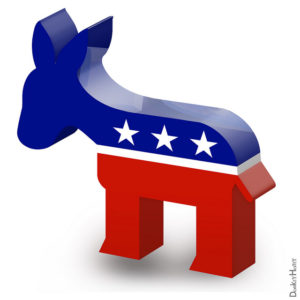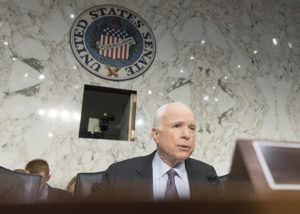
Roy Moore rides off into the sunset
Last Tuesday, Democratic candidate Doug Jones won a stunning upset over Republican Roy Moore in the Alabama U.S. Senate special election. Jones’ win was remarkable given that this Senate seat went over 97 percent for Republican incumbent Jeff Sessions (who early this year left to become U.S. Attorney General in the Donald Trump administration) the last time it was contested in 2014. The Democrats did not even field a challenger to Sessions that time. There were several keys to Jones’ victory, each of which shows that the Democrats can beat the Republicans at the voting booth, if they work extra hard on several fronts:
Continue Reading »
0 Comments -
Leave a comment! Tags: Alabama, child molestor, child predator, Democrats, Donald Trump, Doug Jones, framing, Republicans, Roy Moore, Senate, sexual assault, sexual harassmenet, social media, Twitter

U.S. Senator Al Franken of Minnesota
Following increasing pressure by Congressional Democrats over allegations of sexual impropriety, U.S. Senator Al Franken of Minnesota announced his resignation yesterday. Democratic pressure put only or primarily on Franken (as well as Democratic U.S. House Rep. John Conyers) to resign is a politically grave mistake. At a critical time in history for America, the Democrats are now in a circular firing squad, setting themselves up for defeats of their own making.
Continue Reading »
0 Comments -
Leave a comment! Tags: Affordable Care Act, Al Franken, Bill Clinton, Blake Farenthold, David Vitter, Democrats, Donald Trump, Fox News, John Conyers, Leeann Tweeden, Obamacare, Republicans, Roy Moore, Trent Franks, U.S. Senate

Suspected Trump/Russia connections
Donald Trump has spent much of this year attacking mainstream (non-Murdoch) news media outlets, calling them “fake news.” The term apparently means real news that isn’t flattering to Trump. This can be seen as a strategy to influence us not to believe what we see, hear and read, unless it comes from a pro-Trump media outlet like Fox News. But now Trump seems to have taken his propaganda strategy one step further: he is saying that the “Access Hollywood” tape released in October 16, in which Trump tells host Billy Bush that he likes to “just start kissing women” and “grab them by the pu*sy. You can do anything” is not authentic. What’s going on?
Continue Reading »
0 Comments -
Leave a comment! Tags: Access Hollywood, Billy Bush, CNN, Donald Trump, Fake News, Fox News, Hillary Clinton, Kompromat, news, Russia, Steele Dossier, Trump, Vladimir Putin

Thanksgiving dinner table: calm before the storm
The Democratic Congressional Campaign Committee (DCCC), the official arm of the Democratic Party seeking to elect Democrats to the House of Representatives, has released its annual “Know Your Stuffing” Thanksgiving dinner table talking points. This year’s DCCC guide, sent by email to supporters and available in .pdf format, is billed as a “guide to surviving Thanksgiving with your Republican family.” The DCCC guide, which has a friendly graphical format, has been kept simple, covering just four topics, in the form of suggested Democratic responses to the following political statements expected by Republicans around the Thanksgiving dinner table this Thursday:
Continue Reading »

Rep. Suzan DelBene (D-WA)
If you want to see how to conduct a hard-hitting line of questioning, look no further than the House Ways and Means Committee‘s November 6 hearing on the markup of the Republicans’ wildly misnamed “Tax Cuts and Jobs Act.” The Democrats have already termed the Republicans’ bill the “GOP Tax Scam” for its central elements of cutting taxes for wealthy individuals and corporations, adding well over a trillion dollars to the national debt, and trying to make up for some of the shortfall by taking away important deductions for middle and lower income Americans, including home mortgages, medical expenses, state and local taxes, student loans, and teacher classroom expenses. Corporations, however, would not have to give up these or comparable deductions under the GOP Tax Scam. At last week’s hearing, Democratic Congresswoman Suzan DelBene of Washington took this theme one step further, by calmly asking a series of simple questions to Tom Barthold, the Chief of Staff of the Joint Committee on Taxation. As seen here in the video and in the transcript below, DelBene’s questions cut to the heart of the GOP Tax Scam’s fundamental unfairness:
Continue Reading »

Democratic House Leader Nancy Pelosi with another recent messaging effort
It is very rare for the Democratic Party to come up with a phrase, and have members hammer it home in unison. Thus, it’s noteworthy that leading Democrats are doing just that regarding the Republican U.S. Senate and U.S. House tax bills released over the past week. The Democrats are using the phrase “GOP Tax Scam” to attack these plans. Here is a sampling of those Democratic attacks on Twitter:
Continue Reading »

Democratic Donkey
Dr. George Lakoff, retired professor of cognitive science and linguistics at the University of California at Berkeley and a communications guru for Democrats, asks this week’s key question: “Why are you a Democrat?” Lakoff’s question can be found at his blog, and on his Twitter feed:
Lakoff’s question comes at a crucial time for Democrats.
Continue Reading »
0 Comments -
Leave a comment! Tags: Bernie Sanders, Congress, Democratic National Committee, Democratic Party, DNC, Donald Trump, Donna Brazile, George Lakoff, Hillary Clinton, Politico, Republican Party, Twitter

Sen. John McCain at a recent hearing.
It was big news on Tuesday when Republican U.S. Senator Jeff Flake of Arizona took to the Senate floor to announce that he would not run for re-election, and to attack Donald Trump and fellow Republicans for enabling the Trump administration’s “flagrant disregard for truth or decency” and a “regular and casual undermining of our democratic norms.” Just hours later, however, Flake joined all but two of his Republican colleagues to strike down a new rule from the Consumer Financial Protection Bureau (CFPB) that would have allowed class action lawsuits against financial institutions for predatory and deceptive business practices. This juxtaposition between words and deeds among Republican Senators is sending a mixed message to Americans.
Continue Reading »
0 Comments -
Leave a comment! Tags: Affordable Care Act, Bob Corker, class action, Consumer Financial Protection Bureau, Donald Trump, Jeff Flake, John McCain, Lisa Murkowski, Obamacare, Republican Party, Senate, Steve Bannon, Susan Collins, Twitter

Donald Trump on the golf course, again
Donald Trump‘s approval numbers — as low as 32 percent — are the worst ever for a president at this point in his term. Likewise, Trump’s handling of the hurricanes this season dropped 20 points to just 44 percent after Hurricane Maria devastated Puerto Rico and, instead of focusing on helping the people there (who are Americans), Trump took to the golf course and then criticized them. What’s amazing, though, is that Trump’s approval among Republicans is quite high. Why the disconnect?
Continue Reading »
0 Comments -
Leave a comment! Tags: 401(IK), Affordable Care Act, birther, climate change, Donald Trump, gun control, guns, healthcare, House of Representatives, Hurricane Maria, Puerto Rico, racism, Republican Party, taxes

Puerto Rico devastation from Hurricane Maria
Back in February 2011, we published Messaging Maxim #1: Go On Offense. Perhaps some folks need a refresher course. In that post, we wrote, “If you’re fighting a political battle on the other side’s rhetorical turf, you’ve already lost.” At the time, such advice was referring to phony cultural issues like “Ground Zero Mosque” and “is President Obama a Muslim?” that Republicans had ginned up and repeated everywhere they could (see Messaging Maxim #2: Rinse and Repeat). With their herd mentality, the mainstream media then picked up these issues and focused their broadcasts, cablecasts and column space on them.
Fast forward to today. Donald Trump and the Republicans are doing the same thing again, and it’s working. Currently, the phony cultural issues are: “Kneeling NFL Players” and “Harvey Weinstein.” To those, you can add, “NBC and CNN Licenses.” By next week, expect different cultural issues.
Continue Reading »
0 Comments -
Leave a comment! Tags: California fires, climate change, CNN, Colin Kaepernick, culture war, Donald Trump, election, Facebook, gun control, guns, Harvey Weinstein, healthcare, Hillary Clinton, Hurricane Maria, Instagram, jobs, Las Vegas, NBC, NFL, NRA, President Obama, Puerto Rico, Republican Party, Russia, social media, Twitter












